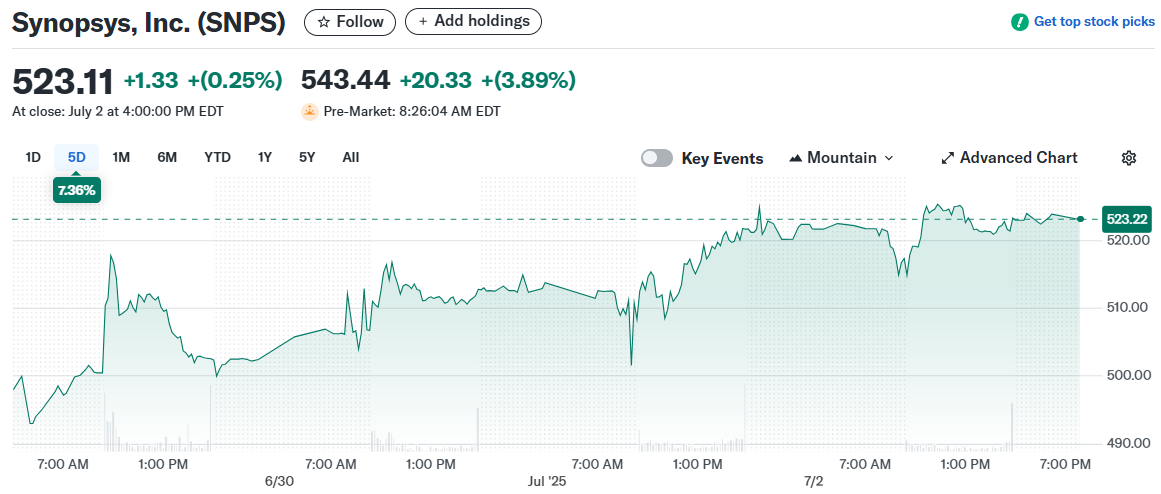TLDR
- U.S. Commerce Department lifted chip design export restrictions on China, reversing late-May curbs
- Synopsys (SNPS) and Cadence Design Systems (CDNS) shares surged 6% and 5.1% respectively in after-hours trading
- Move signals progress in U.S.-China trade negotiations following June framework agreement
- Mizuho analysts see only one-month revenue impact from earlier restrictions, removing key overhang
- Companies expect to restore full access to Chinese customers within three business days
The U.S. Commerce Department has rescinded export restrictions on chip design technology to China. The move sent shares of major electronic design automation companies higher in after-hours trading Wednesday.
$SNPS $CDNS The U.S. has lifted its export ban on chip-design software to China. Synopsys and Cadence can now restore access to their products for Chinese customers, following approval from the Department of Commerce.
Could this signal a softening in tech tensions? 🇺🇸🤝🇨🇳 pic.twitter.com/TXvpgtUeij
— The Future Investors (@ftr_investors) July 3, 2025
Synopsys Inc saw its stock jump 6% to $555.0 following the announcement. Cadence Design Systems Inc shares rose 5.1% to $326.99.

Both companies received official notices from the Commerce Department. The restrictions, imposed in late May, have been lifted effective immediately.
Synopsys issued a statement confirming it was informed by the U.S. Department of Commerce about the rescission. The company said it was “working to restore access to the recently restricted products in China.”
A letter from Synopsys to staff indicated the company expects to complete system updates within three business days. This will restore full access and support to Chinese customers.
Cadence Design Systems also received similar notification from U.S. authorities. German tech company Siemens AG reportedly received comparable notices according to Bloomberg.
The three companies control more than 70% of China’s electronic design automation market. Chinese state news agency Xinhua reported this figure in April.
Trade Relations Show Progress
The regulatory reversal signals advancing trade negotiations between Washington and Beijing. The two nations agreed to a framework trade agreement in June.
China had previously suspended exports of rare earths and related magnets in April. This move responded to earlier U.S. export curbs and disrupted global supply chains.
The rare earths dispute threatened to derail ongoing trade negotiations. Both countries had been working to reduce tit-for-tat tariffs through the May trade deal.
On Friday, China’s commerce ministry confirmed the framework details. China will review export applications for controlled items while the U.S. cancels corresponding restrictive measures.
The U.S. had also suspended licenses for aviation exports during the dispute. GE Aerospace faced restrictions on jet engine shipments for China’s C919 aircraft.
Nuclear equipment suppliers also faced suspended licenses for sales to Chinese power plants. These restrictions appear to be part of the broader trade resolution.
Analyst Outlook Improves
Mizuho analysts view the development as removing a “key overhang” related to China operations. The firm now sees only a one-month revenue impact on both companies from the earlier restrictions.
The commerce department’s action also supports Mizuho’s view on the pending Synopsys merger. The $35 billion takeover of engineering simulation firm Ansys could close by the July 15 deadline.
Chinese regulators are currently reviewing the Ansys acquisition. A report earlier this week suggested Beijing’s potential approval was at an advanced stage.
Synopsys had suspended its annual and quarterly earnings forecasts after the U.S. implemented the original restrictions. The company can now reassess its financial guidance.
Long-term restrictions on Chinese access to EDA software would have impacted China’s chip design industry. The reversal removes this concern for the sector.
The move comes as former President Biden’s administration had tightened export controls on China starting in 2022. These controls aimed to block Chinese access to advanced AI technology.
Companies expect to restore full access to Chinese customers within three business days of receiving the Commerce Department notices.






